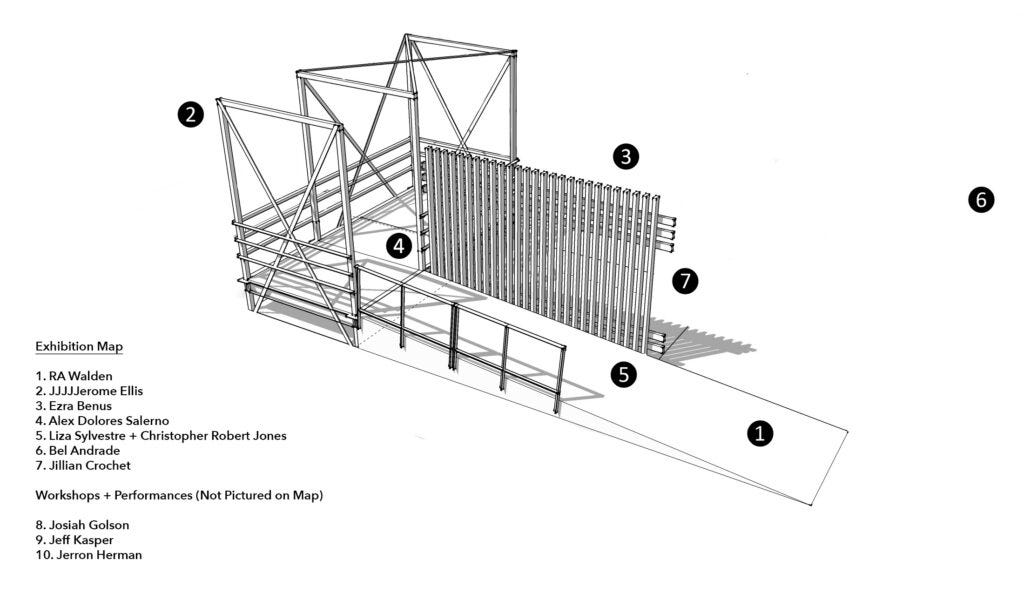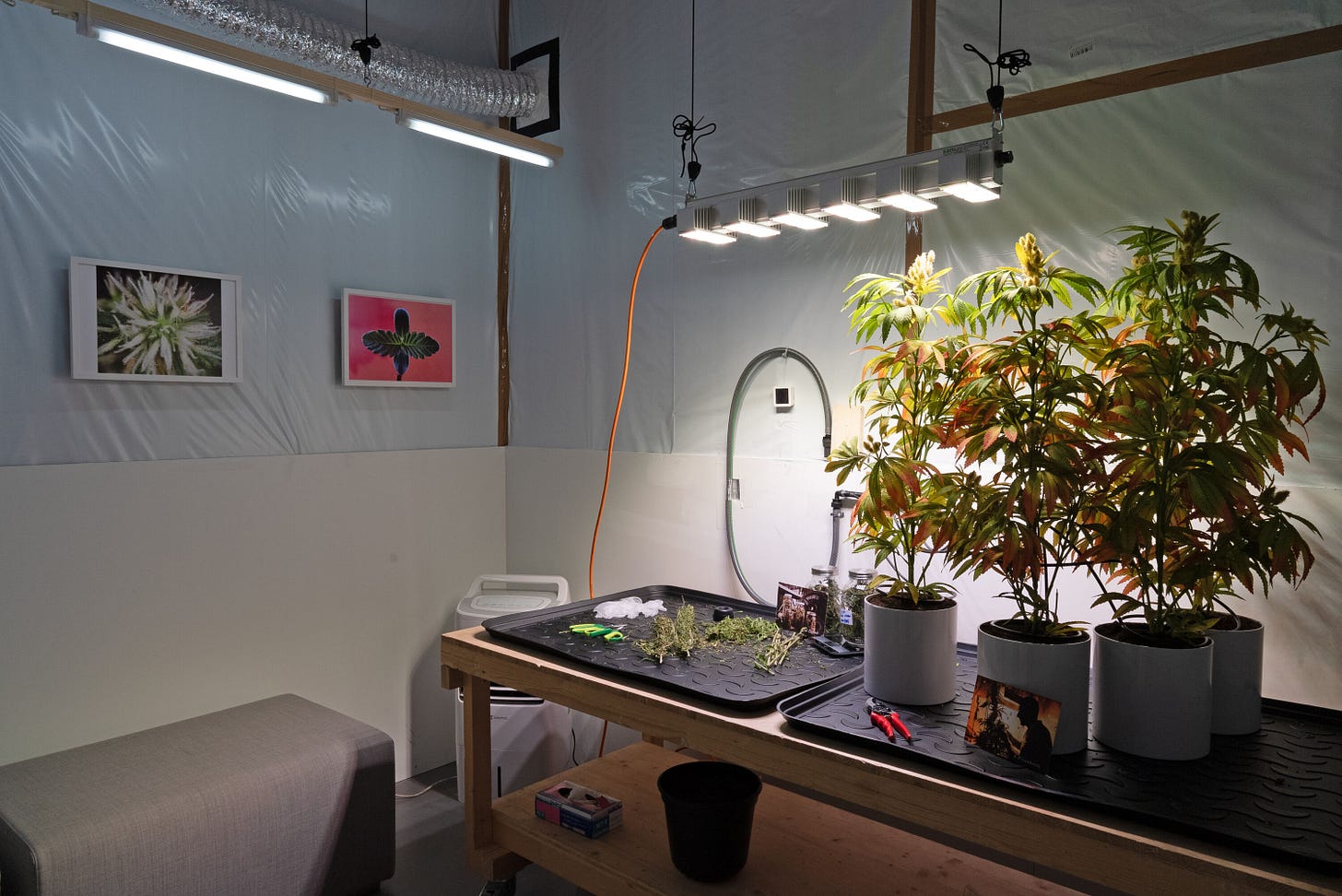Crip News v.103
Access nightmares, new works, calls, and events. Thanks for being here.
NEWS
Access Nightmares for October
For the spooky season, I thought it might be fun to flip the disability-as-horror tropes that haunt us this time of year (excepting some classics we’ve reclaimed and possibly some fresher takes) by rounding up some real-life terrifying "access nightmares.” (This is a light-hearted take against the backdrop of life-or-death access failures continue to sweep the globe. More on those in the “Intensities” section of an upcoming issue.)
A university coopts preparations for access collaborations by censoring one of the best and baddest disability organizers.
A wealthy artist integrates walkers, wheelchairs, and canes as confusing metaphors of destitution in a show at Gagosian.
Another prominent artist relishes the inaccessibility of a newly restaged work that many disabled audiences cannot experience.
New Works
Grand Rapids, MI-based DisArt recently previewed its “Art of Disruption: Expressions of Black and Disabled Protest” exhibition during Art Prize. The full set of artists who will show work in the show in 2024 includes: Alex Dolores Salerno, antoine williams, Becci Davis, Bel Andrade, Constantina Zavitsanos, Emilie Gossiaux, Ezra Benus, fields harrington, Finnegan Shannon, Indira Allegra, Jason Patterson, Jeff Kasper, Jazzmen Lee Johnson, Jerron Herman, Jillian Crochet, JJJJJerome Ellis, Jordan Seaberry, Josiah Golson, Julian Louis Phillips, Krystal C. Mack, Liza Sylvestre, Oaklee Thiele, Pelenakeke Brown, RA Walden, Tasha Dougé, Tyanna Buie, Yanni Young, and Yo-Yo Lin.
Rehearsing Freedoms is a month-long, multi-site festival of community health, healing, movement building, arts and culture initiated by Healing Justice Ldn which asks: “How can we root visions for radical and just health in safety, dignity, and belonging in order for us all to live whole and flourishing lives? What capacities, skills, and strategies do we need to practice to help us get free together?” Runs through Nov. 11.

Jay Afrisando: is sound is tactile is visual is sound is is on view at Curb Appeal Gallery, the apartment gallery in Chicago run by Todd Garon and Sandy Guttman, through Nov. 11.
A new episode of Justin Cooper and Kennedy Healy’s Crip Crap Podcast features a conversation with Terri Lynn Hudson about access in acting.
Interdependencies: Perspectives on Care and Resilience is open at the Migros Museum für Gegenwartskunst in Zurich through Jan. 21, 2024. Featuring works by Adina Pintilie, Carmen & Antonio Papalia, Carolyn Lazard, Ezra Benus, Grace Ndiritu, Jesse Luke Darling, Johanna Hedva, Lauryn Youden, Maryam Jafri, Rory Pilgrim, Sharona Franklin, the vacuum cleaner and collaborators, Alina Szapocznikow and Marijke van Warmerdam.
For the University of Virginia’s Scholars’ Lab, doctoral student and artist Molly Joyce writes about permanently unresolved tensions in “Access as Praxis.”
Alison Stine asks “What Can a COVID Outbreak at a Writing Conference Teach Us about Community Care?” in Nonprofit Quarterly.
Against Technoableism: Rethinking Who Needs Improvement by Ashley Shew is out from WW Norton. An excerpt was recently published in Wired.
Emily McDermott interviews Emilie L. Gossiaux in the October issue of ArtReview.
Panteha Abareshi recently presented “The Sick/Disabled Body as Fetish Object: A Pornographic Screening, Sharing, & Discussion” with One Institute in LA.
BRICLab, “a multi-disciplinary residency program created to advance opportunities for visual artists, performers, and media makers,” announced several artists exploring disability and chronic illness in their 2023/2024 cohort, including Alex Dolores Salerno, Pelenakeke Brown, and Yasi Ghanbari.
Congratulations, Carolyn Lazard
One of the very first subscribers to this newsletter, Carolyn has been named a 2023 MacArthur Fellow for their brilliant work “exploring the limits of aesthetic perception and using accessibility as a creative tool for collective practices of care.”
CALLS
Root Division invites Disabled artists working in all media to submit work for Crip’d Ecologies: Unfurling Expanded Environments, co-curated by moira williams and Jeremiah Barber, to be presented at Root Division in February 2024.
SICK Magazine is accepting applications for $250 micro-grants for sick/disabled sculptors. Deadline is Oct. 31 at 11:59pm ET.
The International Documentary Association’s Nonfiction Access Fund is awarding up to $5,000 of direct funding toward the development of practices that allow non-fiction media makers and their teams to widen access capacity within their projects. Deadline is Oct. 31.
The “Beyond the Normative Knot: Life and Praxis at the Gender-Sexuality-Autism Nexus” project initiated by Elizabeth Straus, a queer-autistic-disabled researcher with Re•Vision: The Centre for Art and Social Justice at the University of Guelph, is recruiting two part-time community co-researchers interested in being part of a project to help challenge stereotypes about gender, sexuality, and autism and make positive change in the community. Deadline is Oct. 29.
Visual AIDS is hiring a part-time Community Archivist.
The Television Academy Foundation’s College Television Awards are accepting submissions for the $10,000 Loreen Arbus Focus on Disability Scholarship. Deadline is Thursday, Oct. 19 at 5pm PT.
Song of the Spirit Institute and Ayeko Farm are raising funds for their recent Reclaiming Alignment retreat “ensuring farmers, climate organizers, food justice workers, and those with a rich and dedicated relationship to nurturing the care of our planet will get held in rest, restoration, and the chance to be resourced for the coming seasons of frontlining essential work.” Donate here.
Heidi Latsky Dance is seeking participants for its ON DISPLAY GLOBAL 24 Hour Zoom event and/or coordinators for in-person local installations honoring the United Nations' International Day of Persons with Disabilities on Dec. 3. Performers/Sculptures can register for a training session. Others, including Ambassadors and collaborating organizations and email Jamie@heidilatskydance.org.
EVENTS
Superfest Disability Film Festival
Thursday, Oct. 19 - Sunday, Oct. 21
“The longest running disability film festival in the world” is back this week. Since it first debuted in a small Los Angeles showcase in 1970 it has become an eagerly anticipated international event—hosted by Paul K. Longmore Institute on Disability at San Francisco State. For more than 30 years, Superfest has celebrated cutting-edge cinema that portrays disability through a diverse, complex, unabashed and engaging lens. Superfest is one of the few festivals worldwide that prioritizes access for disabled filmgoers of all kinds.
Face of the Blind: What Image Description Brings to Photography
Thursday, Oct. 19, 1 - 2pm ET, on Zoom
Face of the Blind is the working title for a planned series of essays inspired by the many anonymous blind subjects in the Miriam and Ira D. Wallach Division of Art, Prints and Photographs. For Leona Godin, who is herself blind, image description functions as both source material and access to source material. Yet there is no “correct” way to describe a photograph. As Georgina Kleege suggests in More than Meets the Eye: What Blindness Brings to Art, “absolute objectivity” is not possible nor “even desirable." Each describer brings new details and perspectives to an image. This “slow seeing” through language is reminiscent of Susan Sontag’s call for “acts of criticism which would supply a really accurate, sharp, loving description of the appearance of a work of art.” David Lowe, photography specialist in the Wallach Division, will join Godin in discussion of key photos, beginning with Paul Strand’s iconic “Blind Woman,” published in Camera Work in 1917.
Organizing for Survival: Disability Advocacy during Russia's War Against Ukraine, from refugees to veterans
Wednesday, Oct. 18, 12 - 1:30pm ET, on Zoom
Disability advocacy is an often-overlooked arena of human rights civic organizing. This roundtable brings together three researchers with new and on-the-ground knowledge of the impacts of the war on disability advocacy and policy, and on disabled people and their families: Dr. Magdalena Szarota, Hanna Zaremba, and Ivan Shmatko. Drawing on expertise, research, and activism, panelists will discuss experiences of wounded Ukrainian soldiers; the impact of the war on disabled civilians; and how disability advocacy networks and organizations led by disabled people have responded, in both Ukraine and in neighboring Poland to support disabled refugees. Taken together, a new picture of disability experience in war time begins to emerge, as well as a deeply changed political landscape for disability advocacy. What are the lived experiences of living with or acquiring disability in Ukraine (or of fleeing Ukraine) in war time? How are disability advocacy leaders understanding the task at hand? What is needed now? What global networks or historical examples are useful in a situation like this one?
How do you make/hack your wardrobe to make it fully celebrate the intersection of all of your identities?
Saturday, Oct. 21, 12 - 2pm ET, on Zoom
The Founder of Rebirth Garments, Sky Cubacub, will be doing interactive draping demos using a no sew method of designing in our own closets, to promote creativity and imagination. We will play with Sky’s surrealist Garment Generator Game to brainstorm drawing up new designs through fun constraints. By centering our joy and our identities, we can send the message that disabled queers deserve accommodations not just in terms of mobility but also in terms of our expression and our right to be seen.
Decolonial partnerships with disability communities in the Global South
Monday, Oct. 23, 10 - 11:30am ET, on Zoom
This webinar will feature three disability activists, advocates and/or scholars from the Global South - Jace Nair, Shilpaa Anand, and Alexis Padilla - as they discuss their views and perspectives related to decolonial partnerships across varied spaces and realities.








I’m also sick of the trope. It’s made my relationship with horror complicated as I’ve become more disabled and an activist. I wrote an article about that (and why I wrote a crip horror novel) + found a great list with movies that feature disabled characters (in god and bad ways), if you’re interested in sharing either.
https://creepycatalog.com/horror-movies-with-disabled-characters/
https://booksbywomen.org/why-i-wrote-a-disabled-serial-killer/